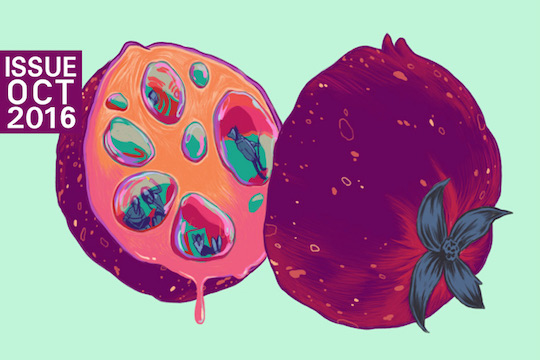In “Verisimilitude,” the Fall 2016 issue of Asymptote, Assistant Editor K.T. Billey edited a stellar special feature on Canadian Poetry. Reaching far beyond the exchange between French and English, this section presents a diverse group of authors and translators that reflects a multitude of cultural and historical intersections and conflicts. Now, Billey situates and introduces the poets and translators. Delve into the special feature here.
Global readers likely are aware of Canada’s official French/English bilingualism. What the literary world may not know about—and what Asymptote is delighted to spotlight in our Fall 2016 issue—is the range of Aboriginal and First Nations voices that are fundamental to Canada’s evolving identity. The Special Feature on Canadian Poetry introduces readers to three of the approximately sixty distinct Indigenous languages spoken in Canada.
Multilingual poems by acclaimed poet Duncan Mercredi are a crystalline example of the verisimilarity that unites the Fall issue. Duncan’s brother Joe translated the English portions of Duncan’s poems into their native Cree, a language whose dialects nearly span the entire North American continent. Joe’s line-by-line translations became, and are recognized as, part of the poems rather than separate works. The poems are unified though their dual-linguistic nature, exacerbating and expressing the ambivalence of a First Nations poet writing in English.
Emerging Two-Spirited poet Gwen Benaway embodies Anishinaabe and Métis descent, blending Anishinaabemowin and English in poems about transitioning as an Indigenous woman. Ancestral language plays a key role in these powerful twenty-first century poetics—as Benaway expresses it, “Anishinaabemowin is the only way to speak the part of this change which falls outside of Western narratives of what it means to be ‘trans.’”
An Innu poet writing in French, Natasha Kanapé Fontaine’s incorporation of First Nation linguistics into “Gathering” mirrors the confluence that is Canadian history. Howard Scott’s translations convey a poetic address that is as defiant as it is sensual, summoning the body and landscape.
Poetry in translation reflects Canada’s French heritage and Francophone immigration. Governor General Award-winner Marcel Labine’s “The Correct Version,” translated by John Gilmore, questions the absurdity and power of the act of writing. Marie-Célie Agnant’s poems combine the politics of place, race, and gender from her native Haiti and beyond, spinning trajectories of displacement and justice in translations by Siobhan Marie Meï.
A country that takes pride in a mosaic model of multiculturalism becomes home to an abundance of languages, enriched by the inclusion of exiles and immigrants. Rokhl Korn fled WWII to become a major presence in Montréal’s literary community, and her work here is translated from the Yiddish by Tanjil Rashid. Elie Wiesel said of Korn: “No one else has her ability to paint the landscape of a buried village.” Bolivian-Canadian Alejandro Saravia is part of a growing community of Latin American writers in Canada. Translated by María José Giménez, Saravia’s intertextual dynamics dig into the layers of identity and influence that comprise Canadian literature.
The word “Innu” means “human being.” The equation of humanity with community and common tongue is a beautiful linguistic achievement—and the overarching goal of this Feature. From Aboriginal poets to the newest citizens, we hope you enjoy this glimpse into Canada’s linguistic diversity.
K.T. Billey’s debut collection Vulgar Mechanics is a finalist for Fordham Lincoln Center’s Poets Out Loud Prize. Stormwarning, Billey’s translation of the third book of poems by Icelandic poet Kristín Svava Tómasdóttir, is forthcoming from Phoneme Media in 2017. An Icelandic-Ukrainian Canadian originally from rural Alberta, Canada, Billey’s translations from Icelandic and Spanish have appeared or are forthcoming in The Harvard Review, Circumference, the Council for European Studies’ Europe Now, and Palabras Errantes.
*****
Read More on Canada:

